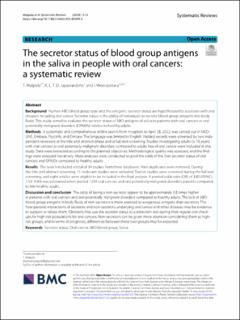| dc.contributor.author | Walpola, Thamodi | |
| dc.contributor.author | Jayawardene, Dilrukshi | |
| dc.contributor.author | Rajapaksha Mudiyanselage, Ishanka | |
| dc.date.accessioned | 2024-04-15T07:54:42Z | |
| dc.date.available | 2024-04-15T07:54:42Z | |
| dc.date.created | 2024-01-08T11:34:12Z | |
| dc.date.issued | 2024 | |
| dc.identifier.citation | Systematic Reviews. 2024, 13 (1), . | en_US |
| dc.identifier.issn | 2046-4053 | |
| dc.identifier.uri | https://hdl.handle.net/11250/3126429 | |
| dc.description.abstract | Background Human ABO blood group type and the antigenic secretor status are hypothesized to associate with oral diseases including oral cancer. Secretor status is the ability of individuals to secrete blood group antigens into body fluids. This study aimed to evaluate the secretor status of ABO antigens of saliva in patients with oral cancers or oral potentially malignant disorders (OPMDs) relative to healthy adults. Methods A systematic and comprehensive online search from inception to April 28, 2022, was carried out in MEDLINE, Embase, PsycInfo, and Emcare. The language was limited to English. Yielded records were screened by two independent reviewers at the title and abstract phase and at full-text screening. Studies investigating adults (≥ 18 years) with oral cancers or oral potentially malignant disorders compared to adults free of oral cancer were included in this study. Data were extracted according to the planned objectives. Methodological quality was assessed, and the findings were analyzed narratively. Meta-analyses were conducted to pool the odds of the non-secretor status of oral cancers and OPMDs compared to healthy adults. Results The search included a total of 34 studies from three databases. Nine duplicates were removed. During the title and abstract screening, 11 irrelevant studies were excluded. Twelve studies were screened during the full-text screening, and eight articles were eligible to be included in the final analysis. A pooled odds ratio (OR) of 3.80 (95%CI, 1.53–9.44) was estimated when pooled 1254 oral cancers and oral potentially malignant disorders patients compared to 666 healthy adults. Discussion and conclusion The odds of being a non-secretor appear to be approximately 3.8 times higher in patients with oral cancers and oral potentially malignant disorders compared to healthy adults. The lack of ABO blood group antigens in body fluids of non-secretors is more exposed to exogenous antigens than secretors. The host-parasite interactions of secretors and non-secretors underlying oral cancer and other diseases may be evidence to support or refuse them. Clinicians may use the secretor status as a detection test during their regular oral check-ups for high-risk populations for oral cancers. Non-secretors can be given more attention considering them as high-risk groups, and in terms of prognosis, differences between these two groups may be expected. | en_US |
| dc.language.iso | eng | en_US |
| dc.publisher | BioMed Central | en_US |
| dc.rights | Navngivelse 4.0 Internasjonal | * |
| dc.rights.uri | http://creativecommons.org/licenses/by/4.0/deed.no | * |
| dc.title | The secretor status of blood group antigens in the saliva in people with oral cancers: a systematic review | en_US |
| dc.type | Peer reviewed | en_US |
| dc.type | Journal article | en_US |
| dc.description.version | publishedVersion | en_US |
| dc.rights.holder | © The Author(s) 2023 | en_US |
| dc.source.pagenumber | 10 | en_US |
| dc.source.volume | 13 | en_US |
| dc.source.journal | Systematic Reviews | en_US |
| dc.source.issue | 1 | en_US |
| dc.identifier.doi | 10.1186/s13643-023-02399-8 | |
| dc.identifier.cristin | 2222139 | |
| dc.source.articlenumber | 13 | en_US |
| cristin.ispublished | true | |
| cristin.fulltext | original | |
| cristin.qualitycode | 1 | |

